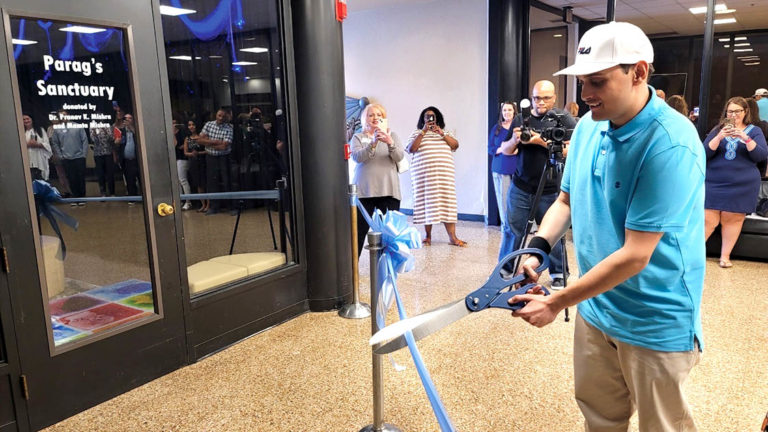Photo: Parag Mishra stands in front of Parag’s Sanctuary, a sensory-inclusive room at the Mary G. Hardin Center for Cultural Arts. (Katie Bohannon, Messenger)
By Emma Kirkemier, News Editor
The Mary G. Hardin Center for Cultural Arts hosted its first Autism Spectrum Conference on May 14, offering resources to local families, community members and educators.
The conference featured local medical, education and public safety professionals. Parents and educators of autistic children led several sessions. Sponsoring the event were Gadsden Regional Medical Center and Gadsden State Community College.
Mamta Mishra, author of Autism: Our Journey and Finding Happiness, spoke on her experience raising her son Parag, who was diagnosed with autism spectrum disorder at 2 years old. Mishra holds a Master of Science in Education.
“As a special education teacher, I am equipped to handle those (students) with autism,” Mishra said. “But many general educators are not.”
Mishra said as both a special educator and a parent, she knows “both sides of the (educational) story,” and parents and teachers must collaborate to make general education more accessible to autistic children.
“Eliminating confusion is the way to start the journey to acceptance,” she said.
Providing autistic children with self-soothing coping mechanisms, Mishra said, gives them “healthy ways to deal with” overstimulating situations that could lead to meltdowns.
One of these tools is a sensory-inclusive room.
As defined by the Autism Self Advocacy Network, “Designated sensory retreat rooms provide a safe space to manage overload and give people a place to go if they need to retreat from an overstimulating and/or overwhelming situation.”
According to ASAN, these rooms should be “easily accessible but free of outside stimulation.” Providing disposable earplugs and non-fluorescent lighting can help ameliorate light and sound sensitivity in these areas.
The Hardin Center opened a sensory-inclusive room named for Parag the day of the conference.
“It’s a zen place, a sanctuary for all the kids,” Mishra said. “[It’s] a place where we can all just decompress.”
Parag’s Sanctuary is open to visitors of the Hardin Center.
Sensory-inclusive rooms can help make public spaces accessible for autistic visitors. Mishra noted, however, that these accommodations also suggest ways parents can help their own children at home. Awareness, she said, “leads to inclusion.”
“Many people think when their autistic child comes out of school, there’s nothing there,” Mishra said. “That’s not true. There are all these services, resources and organizations. People just need to know about them.”
Mishra encouraged parent support groups as means to provide “the resources and help they (parents or guardians) need, that the child will need.”
Mishra emphasized the importance of education for first responders.
“We want all of them to be trained and educated on how to deal with nonverbal autistic adults,” she said. “I want every first responder to know the signs of distress in autistic individuals like hand flapping. They need to know that this isn’t a threat. Hand flapping is a self-soothing behavior, and it shouldn’t be seen as aggressive.”
The conference featured a workshop for first responders focusing on appropriate responses and safety for individuals with autism.
Former local educator Teresa Rhea said that she reached out to several local governments, including Gadsden, Southside and Rainbow City, “to make sure that as they come into contact with autistic individuals, they know the signs and what to look for.”
Mishra said that her son wears a wristband with his emergency contacts and the information that he is autistic. She said the wristband is “just like the ones many people wear who are diabetic” in case of emergency.
Dr. Larry Beard of Jacksonville State University spoke on assistive technologies for those with autism. Rhea noted that research is “ever-evolving.”
One such research technique was described on the Autism Self Advocacy Network website.
“ASAN supports Community Based Participatory Research. This means that members of the community help make the research projects that are about us. Researchers and the autistic community can work together to help make our lives better.”
Katie Bohannon contributed to this article.





